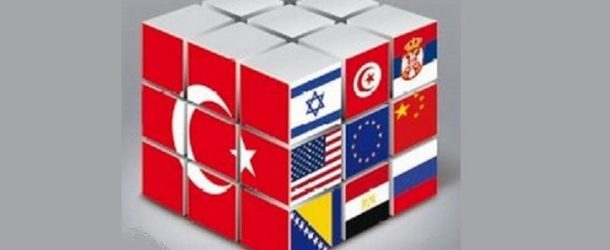Turkish and international analysts express their views on the recent activism in Turkish foreign policy in last few days. With the Rome Consensus on June 27, 2016, Turkey and Israel signed a protocol to normalize their relations. Although this was labeled as a “not so important deal” by Steven Cook[1], it would definitely start a new era in bilateral relations of these countries after a problematic decade. Another important step was taken simultaneously by the Turkish President of the Republic Mr. Recep Tayyip Erdoğan concerning Turkish-Russian relations. Following the shooting down of a Russian jet violating Turkish airspace last year, two countries engaged in confrontational relations and started to implement embargos on each others’ products. This led to economic problems in both countries in recent months and a severe crisis in Turkish tourism industry. However, yesterday, Russian officials announced that Turkish President Erdoğan sent a letter to Kremlin for expressing his condolences for the dead Russian pilot, a gesture showing his good-will and empathy for Russia.[2] This might lead to a normalization process in Turkish-Russian relations as well, although both countries still have opposite positions concerning Syrian and Ukraine crises as well as Nagorno-Karabakh dispute. These two steps, together with a growing critical tone towards European Union point out a new chapter in Turkish foreign policy. So, what could be the reason of this sudden change in Turkish foreign policy?
The first reason of this change is related to Turkey’s internal dynamics. It is no coincidence that these changes took place following the resignation of Prime Minister Ahmet Davutoğlu. Davutoğlu, as a man of academics and a well-known and respected Professor of International Relations, was a Prime Minister that has been very influential in designing foreign policy priorities of the country by himself rather than the Ministry of Foreign Affairs, an institution largely seen as the most rooted state apparatus in the country having an autonomous identity. However, now, with its new Prime Minister Binali Yıldırım and a more independent Mevlüt Çavuşoğlu as the Minister of Foreign Affairs, Turkey has begun to implement a different foreign policy.
The second reason of this rapid change might be related to the harsh critics towards Turkey about its foreign policy concerning Syria. Turkey openly supported revolutionary groups in Syrian civil war; but these groups failed to realize the regime-transition and revolutionary Syrian “spring” turned into a bloodbath after the emergence of ISIS. Due to this failure, Turkey was falsely accused of supporting ISIS and international powers began to support Kurdish groups such as PYD and YPG against ISIS. However, since these Kurdish groups are seen equally dangerous as PKK by Turkey, Turkey decided to change its foreign policy towards Syria. From now on, Turkey will choose either a normalization process with Assad government or closer relations with Syrian Kurdish groups in order to exert its authority over them. Normalization with Assad government might take reactions from Islamic groups, whereas engaging in close relations with Kurdish groups will lead to nationalist opposition in the country. It seems like Turkey’s Western allies including USA and EU will prefer Turkey’s close collaboration with Kurdish groups, whereas Russia and Iran might be more willingly to see Turkey engaging in a normalization process with Assad government in order to crush the revolutionary Sunni Islamist groups in Syria.
The third reason of the policy change is related to the growing security concerns of the country. Turkey, in recent years, enjoyed the privilege of having problematic relations with nearly all of its neighbors including Russia, Syria, Iran and Israel as well as Egypt. This led a rising terror wave in the country originated from Islamic fundamentalist ISIS (ISIL-IS) and pro-Kurdish PKK. Turkish military launched a military campaign against PKK in the southeastern Anatolia in recent months and few hundreds of Turkish soldiers and civilians died recently. Since Turkish government analyzes this terrorism wave directly related to emerging problems with Russia, Syria and Iran, authoritarian regimes that have never hesitated to support terrorism against their enemies in the past, Turkey might be willingly to engage in better relations with Russia, Iran and Syria. The lack of support given from Washington and NATO also forced Turkey to change its foreign and security policy since these are not European countries or USA, but only Turkey and Israel that constantly feel the threats coming from terrorist groups in the region.
The fourth reason might be based on economic necessities. Turkish-Russian confrontation had terrible effects over two countries’ economies as well. Turkish economic growth decreased to 3 % from 7 %, whereas Russian economy had an economic shrinkage because of Western economic sanctions. In addition, problems with Russia terribly affected Turkish tourism industry this summer until now. Moreover, recent natural gas discoveries in the Eastern Mediterranean region around Cyprus, Egypt and Israel led to hopes in Ankara for finding alternative and cheaper energy provider countries following normalization with Israel and a political solution or at least an economic agreement in Cyprus. Thus, this rapid change in Turkish foreign policy also has an economic rationale.
Change in Turkish foreign policy will probably continue with a possible normalization with Egypt, closer relations with Russia and growing cooperation with Israel. However, for a stable period, Turkey still has to wait for the U.S. foreign policy preferences towards the region which will be determined after the Presidential elections in this country. Hillary Clinton or Donald Trump’s policy preferences for the region (Middle-East) will naturally affect Turkey since the country still protects its close-ally status with the USA.
Dr. Ozan ÖRMECİ
[1] http://blogs.cfr.org/cook/2016/06/27/israel-and-turkey-no-big-deal/.
[2] http://www.cnnturk.com/dunya/kremlin-erdogan-putine-uzuntulerini-iletti.

























































